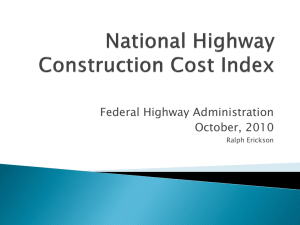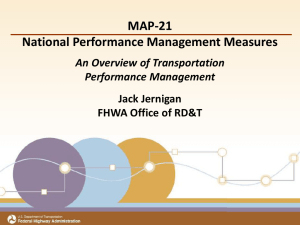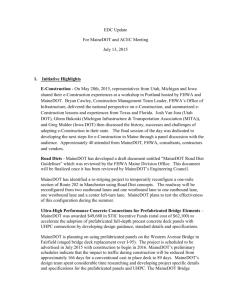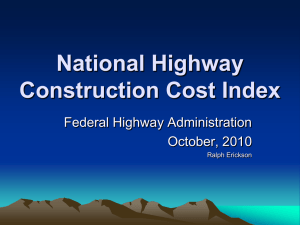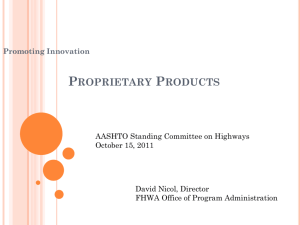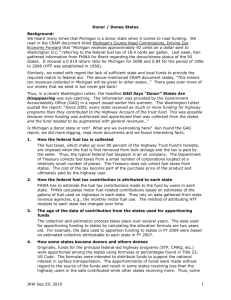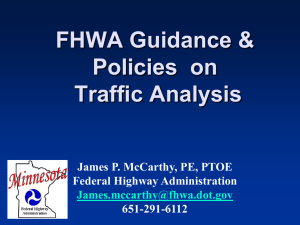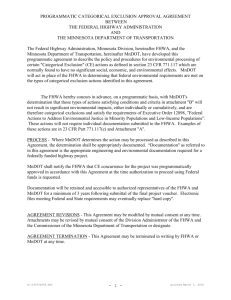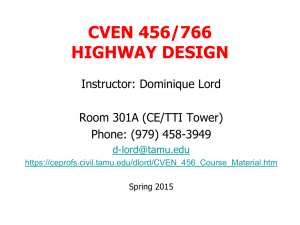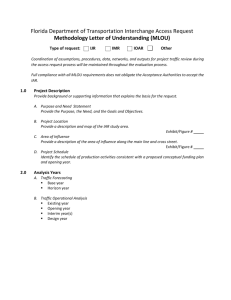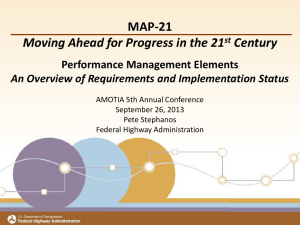Traffic Flow and Capacity Analysis - Department of Civil Engineering
advertisement
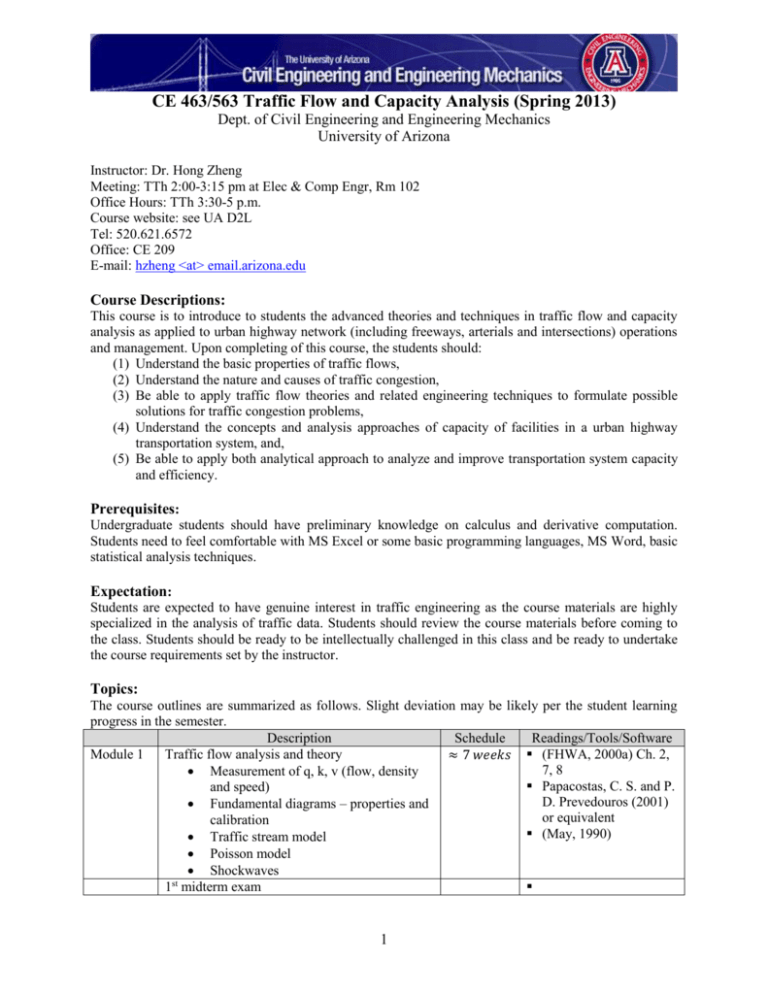
CE 463/563 Traffic Flow and Capacity Analysis (Spring 2013) Dept. of Civil Engineering and Engineering Mechanics University of Arizona Instructor: Dr. Hong Zheng Meeting: TTh 2:00-3:15 pm at Elec & Comp Engr, Rm 102 Office Hours: TTh 3:30-5 p.m. Course website: see UA D2L Tel: 520.621.6572 Office: CE 209 E-mail: hzheng <at> email.arizona.edu Course Descriptions: This course is to introduce to students the advanced theories and techniques in traffic flow and capacity analysis as applied to urban highway network (including freeways, arterials and intersections) operations and management. Upon completing of this course, the students should: (1) Understand the basic properties of traffic flows, (2) Understand the nature and causes of traffic congestion, (3) Be able to apply traffic flow theories and related engineering techniques to formulate possible solutions for traffic congestion problems, (4) Understand the concepts and analysis approaches of capacity of facilities in a urban highway transportation system, and, (5) Be able to apply both analytical approach to analyze and improve transportation system capacity and efficiency. Prerequisites: Undergraduate students should have preliminary knowledge on calculus and derivative computation. Students need to feel comfortable with MS Excel or some basic programming languages, MS Word, basic statistical analysis techniques. Expectation: Students are expected to have genuine interest in traffic engineering as the course materials are highly specialized in the analysis of traffic data. Students should review the course materials before coming to the class. Students should be ready to be intellectually challenged in this class and be ready to undertake the course requirements set by the instructor. Topics: The course outlines are summarized as follows. Slight deviation may be likely per the student learning progress in the semester. Description Schedule Readings/Tools/Software Module 1 Traffic flow analysis and theory ≈ 7 𝑤𝑒𝑒𝑘𝑠 (FHWA, 2000a) Ch. 2, 7, 8 Measurement of q, k, v (flow, density Papacostas, C. S. and P. and speed) D. Prevedouros (2001) Fundamental diagrams – properties and or equivalent calibration (May, 1990) Traffic stream model Poisson model Shockwaves 1st midterm exam 1 Module 2 Module 3 Spring break no class Highway capacity analysis and level of service Freeway Multiple lane highway Two lane rural highway 2nd midterm exam Traffic simulation Final exam 3/9-3/17 ≈ 4 𝑤𝑒𝑒𝑘𝑠 ≈ 3 𝑤𝑒𝑒𝑘𝑠 5/3-5/9 (FHWA, 2000a) Ch. 21, 22, 23, 24, 25 (FHWA, 2000b) (FHWA, 2003a), (FHWA, 2003b), (FHWA, 2004) TSIS manual Make-up Sessions It is anticipated that the instructor may skip 2-3 regular sessions during this semester due to other research commitments. Make-up sessions will be scheduled at the instructor’s discretion. If it is to be scheduled, it will be in the evening time in the following week. Time and location will be announced separately. Homework Assignments Several homework assignments will be given throughout the semester. The worst homework grade will be dropped from the final grade calculation. Homework is due at the beginning of the class on the day it is due. Homework handed in late will have the following penalties: Up to 1 class late: 5 points; up to 2 classes late: 10 points; up to 3 classes late: 30 points. No credit will be given after the homework solution is posted on D2L. Prior approval from the instructor is needed for a student to be exempted from the above policy for a particular assignment. Appeal of homework grade needs to be submitted to the professor through the D2L e-mail within one week after posting of homework grade. No appeal would be accepted if the appeal is delivered verbally or if the appeal passes the due date. It is the student’s responsibility to regularly check the posting of grades. Homework needs to be delivered in hard-copy, presented in a professional manner. Each assignment should have a title page indicating name, date, course, and assignment number. Partial credit will be given for solving the problem using the correct method but not yielding the correct answer. No credit will be given to problems with answer but no clearly written calculation. Final answers should be clearly identified. Page numbers should be clearly indicated. Discussing with peer classmates is encouraged. However, each student needs to produce his/her own solutions. Copying another person’s work, without attribution, including copying of any part or the whole of computer files or material from the Internet, is considered plagiarism. It will be prosecuted as a violation of the University of Arizona Student Code of Conduct, in accordance with the Code of Academic Integrity. This code is published on-line at http://dos.web.arizona.edu/uapolicies/. It is the student’s responsibility to be familiar with these Codes. Exams Two midterm exam and one final exam will be given during the semester. Makeup exams are not usually given except unexpected special extenuating circumstances. However, for a legitimate schedule conflict and with the instructor’s approval, a student may be able to take the exam at a different time. Scaling of exam grade may be permitted for the entire class. Graduate students may be given additional questions at the exam. If this occurs, the total points will be scaled to the same as those for the undergraduate students after adding the additional questions. 2 Term Project Report Term project report is required only for graduate students. Graduate student needs to deliver a term project report during the final week. Grading Policy Different grading policies apply to undergraduate and graduate students as follows. Undergraduate Graduate Homework 30% 25% Midterm Exam 35% 25% Final Exam 35% 25% Term Project Report -25% This course will be graded on a straight scale with the following grade thresholds. The professor reserves the right to make final adjustments. Total percentage of points earned Final Grade 90 -100 % A 80 – 89.9 % B 70 – 79.9 % C 60 – 69.9 % D < 60% F Course Materials Course materials can be accessed through D2L. Other additional readings may be announced during the semester. FHWA (2000a). Highway Capacity Manual 2000. Washington, D.C., FHWA. FHWA (2003a). Traffic Software Integrated System (TSIS). Version 5.1. FHWA (2003b). TSIS Manuals and Documentation. Washington, D.C., FHWA. FHWA (2004). Traffic Analysis Toolbox Volume I: Traffic Analysis Tools Primer. McLean, VA, TurnerFairbank Highway Research Center: 34. May, A. D. (1990). Traffic Flow Fundamentals. New Jersey, Prentice Hall. Papacostas, C. S. and P. D. Prevedouros (2001). Transportation Engineering & Planning, Prentice Hall (or others equivalent) Mannering, F.L. et al (2009) Principles of Highway Engineering and Traffic Analysis, 4th ed., Wiley (or others equivalent.) Computer software (CE computer lab, or Transportation Lab in Dr. Hickman’s suite) TSIS HCS 2000 Calendar Jan 15, no class. Mar 12, 14, no class (spring break). May 3-9, final week. 3
